|
|
|
Sort Order |
|
|
|
Items / Page
|
|
|
|
|
|
|
| Srl | Item |
| 1 |
ID:
052002
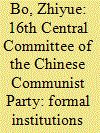

|
|
|
| 2 |
ID:
177954
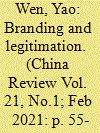

|
|
|
|
|
| Summary/Abstract |
Amid the COVID-19 pandemic, how does the Chinese Communist Party (CCP) attempt to project a positive image both at home and abroad? This article examines China’s party diplomacy—the CCP’s interactions with foreign political parties and organizations as an international actor per se—that is managed by the CCP’s International Department (IDCPC). Mirroring China’s domestic situation, party diplomacy during the pandemic has gone through three stages: “outbreak,” “giving back,” and “new normal.” Party diplomacy is primarily aimed at branding the CCP as a capable and responsible ruling party. The case of a joint open letter initiated by the CCP suggests that party diplomacy has succeeded in soliciting positive responses from some of its foreign counterparts. Moreover, the IDCPC has been increasingly paying attention to China’s domestic audience. Through packaging positive remarks by foreign political elites into domestic propaganda, the IDCPC seeks to not only exhibit the Party’s international prestige and legitimize its rule, but also showcase the department’s own competence. Taken together, the IDCPC emerges as an integrated propaganda vehicle, a hub of favorable information, that links the CCP’s international liaison with domestic legitimation.
|
|
|
|
|
|
|
|
|
|
|
|
|
|
|
|
| 3 |
ID:
112541
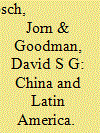

|
|
|
|
|
| Publication |
2012.
|
| Summary/Abstract |
The rise of China is not a new phenomenon. The PRC's growing economic (and in a number of cases also political) involvement in Southeast
Asia and particularly in sub-Saharan Africa has caught the attention of
academics and policymakers alike. However, China's emergence as an
important actor in Latin America has only recently appeared on the radar
screen of the scholarly community and is still an under-researched area.
Eight years have passed since Chinese President Hu Jintao's first tour of
Latin America in November 2004, marking the beginning of a new phase
in Beijing's trans-Pacific relations. The significant boost in Chinese-Latin
American trade provides strong evidence for the importance of this
emerging pattern of interaction. China's trade with the region reached
180 billion USD in 2010, evincing not only an increase of 50 per cent
from 2009 but also a pattern of sharp growth since 2000, when the China-Latin America trade volume stood at just 13 billion USD. By 2007
bilateral trade had already exceeded Hu's original target of 100 billion
USD, set for 2010 (China Daily 2011; Xinhua 2008). The articles in this
issue of the Journal of Current Chinese Affairs bear strong witness to the fact
that this budding relationship has been driven mainly by a mutual desire
to accelerate economic exchange.
|
|
|
|
|
|
|
|
|
|
|
|
|
|
|
|
| 4 |
ID:
190073


|
|
|
|
|
| Summary/Abstract |
China has developed space capabilities with astonishing speed and scope, inviting both admiration and concern. China’s space development spans scientific exploration, business applications, and humanitarian, military, and diplomatic purposes. The existing studies on China’s space capabilities tend to focus on just one of these areas and do not provide a comprehensive understanding of how and why China has been determined in its pursuit of space. This study addresses China’s motivation by analyzing Chinese official documents and other supporting documents and information. At its crux, this study argues that China is driven to develop its space capabilities because they support the Chinese Communist Party’s longevity in power by strengthening its legitimacy to rule the nation.
|
|
|
|
|
|
|
|
|
|
|
|
|
|
|
|
| 5 |
ID:
121560


|
|
|
|
|
| Publication |
2013.
|
| Summary/Abstract |
WHAT DOES China want? As the country's remarkable rise continues and as Beijing's interests seem to clash more frequently with those of its neighbors and the United States, the answer grows ever more important for American policy makers. Recently, a civilian analyst at the U.S. Pacific Command headquarters in Hawaii sought to shed light on the issue. The analyst, Timothy R. Heath, braved the notoriously turgid prose in Chinese official documents and identified the stated "desired end state" for the country. It is wrapped up in the term "national rejuvenation."
|
|
|
|
|
|
|
|
|
|
|
|
|
|
|
|
| 6 |
ID:
141091
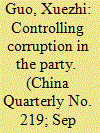

|
|
|
|
|
| Summary/Abstract |
This article investigates a prominent but little discussed CCP central organ, the Central Discipline Inspection Commission (CDIC), and its local discipline inspection commissions (DICs) in the post-Mao era. It analyses how the CCP exerts its control over the disciplinary organizations and argues that the disciplinary agencies' lack of autonomy hinders their efforts to crack down on corruption. This article investigates the important role played by the CDIC in CCP politics by examining its organizational structure, modes of operation and criteria for imposing disciplinary sanctions, and evaluates the measures and approaches employed by the Party's disciplinary organizations to combat corruption. The study concludes that structural, institutional and cultural factors hinder the effectiveness of the CCP's disciplinary agencies in their efforts to control Party members, officials and corruption.
|
|
|
|
|
|
|
|
|
|
|
|
|
|
|
|
| 7 |
ID:
185621
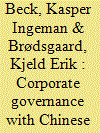

|
|
|
|
|
| Summary/Abstract |
This article analyses the role of the Chinese Communist Party (CCP) in the corporate governance of Chinese state-owned enterprises (SOEs), including a case study of a central-level SOE holding group. Relying on official documents, secondary literature and interviews with enterprise managers, government officials and academics, the article documents how the CCP has actively formalized its role in Chinese business by embedding itself in the corporate governance structure of SOEs. Through the application of Chinese indigenous administrative corporate governance concepts such as “bidirectional entry, cross appointment” and “three majors, one big,” the CCP has consolidated its dominance of enterprise decision-making procedures and personnel appointment and created a hybrid, Party-led model of corporate governance. While this hybrid model can secure enterprise compliance, communication with higher state and Party organs, as well as long-term development planning, it is unlikely to help solve SOE efficiency problems and may even undermine other SOE reforms.
|
|
|
|
|
|
|
|
|
|
|
|
|
|
|
|
| 8 |
ID:
188454
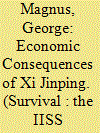

|
|
|
|
|
| Summary/Abstract |
In the aftermath of the 20th National Congress of the Chinese Communist Party, Xi Jinping’s principal focus will be on state and national security, while an entirely new economic- and financial-policy team, with little experience, will take charge of China’s troubled economy. Its members will have to manage several systemic problems – a debt mountain, a property bust, a rapidly ageing population, zero-COVID policies – and develop a viable new economic-development model. This would be a demanding agenda anywhere, but Xi’s China has to tackle it guided by an ever more devoutly Leninist approach to economic management, industrial policy and governance, at a time when China faces the most hostile external environment it has known since Mao Zedong, as exemplified by foreign decoupling. Although Xi’s China is capable of important accomplishments in science and technology, and of flexing its diplomatic and military muscles in defence of its interests, China’s politics may be much less capable of fixing the country’s systemic economic and financial weaknesses. The consequences of Xi Jinping’s economic programme, including an emphasis on self-reliance, promise to extend beyond China’s borders to foreign actors and countries that once benefited from its economic rise.
|
|
|
|
|
|
|
|
|
|
|
|
|
|
|
|
| 9 |
ID:
149743
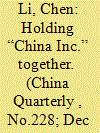

|
|
|
|
|
| Summary/Abstract |
This article investigates the role of the Chinese Communist Party (CCP) in the rise of China's centrally controlled businesses (yangqi 央企), a batch of large business groups and financial institutions controlled by China's central party-state. It starts by comparing two competing policy approaches to defining the relations between the Party and state enterprise sector: the separation approach versus the adaptation approach. It then examines how the Party's “pro-big business” policies have shaped China's large enterprise reform since the 1960s and led to the formation of the yangqi. It also describes the key mechanisms used by the CCP to control the yangqi, including its personnel management system and disciplinary force. It further identifies and summarizes three key modes of the Party's intervention in the rise of the yangqi: institutional and policy entrepreneurship; leveraged personnel control; and residual mobilization capacity. The article concludes by discussing the future prospects for reforming the relations between the Party and big business in China.
|
|
|
|
|
|
|
|
|
|
|
|
|
|
|
|
| 10 |
ID:
126273
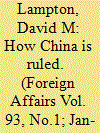

|
|
|
|
|
| Publication |
2014.
|
| Summary/Abstract |
China had three revolutions in the twentieth century. The first was the 1911 collapse of the Qing dynasty, and with it, the country's traditional system of governance. After a protracted period of strife came the second revolution, in 1949, when Mao Zedong and his Communist Party won the Chinese Civil War and inaugurated the People's Republic of China; Mao's violent and erratic exercise of power ended only with his death, in 1976.
|
|
|
|
|
|
|
|
|
|
|
|
|
|
|
|
| 11 |
ID:
179953
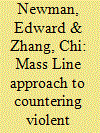

|
|
|
|
|
| Summary/Abstract |
As a strategy to temper centralized governance with a degree of public participation in China, the “Mass Line” approach has been used throughout the history of the Chinese Communist Party (CCP) to mobilize citizens in support of national projects and use this engagement as a channel for feedback. The Mass Line has been employed in attempts to address “radicalization” and challenges to centralized state control, indicating that the CCP’s approach to counter-terrorism goes beyond the top-down, oppressive tactics that China is often associated with. This paper explores China’s programmes of mass mobilization as a part of its counter-radicalization strategy in order to deepen understanding of how the country is responding to a key security challenge. It demonstrates that this approach reflects significant historical continuities, and thus national characteristics, in terms of political culture and state control.
|
|
|
|
|
|
|
|
|
|
|
|
|
|
|
|
| 12 |
ID:
181934
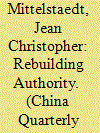

|
|
|
|
|
| Summary/Abstract |
While existing scholarship looks at the relationship between the Chinese Communist Party (CCP) and emerging social strata and civil society, the Party's impact on its own grassroots has been largely overlooked. How does the Party manage its own grassroots members? I argue that the CCP has ritualized its management practices in recent years. Drawing from a dataset of 1,408 “Thematic Party Days” (TPDs) conducted by grassroots Party branches in Beijing, I show how such practices are geared towards integrating ordinary Party members with the Party centre in Beijing and the Party in general. This reflects a major shift in the Party's organizational strategy, moving away from embracing market values and towards reproducing the Party's values and ideology at the grassroots.
|
|
|
|
|
|
|
|
|
|
|
|
|
|
|
|
| 13 |
ID:
101937
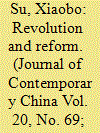

|
|
|
|
|
| Publication |
2011.
|
| Summary/Abstract |
This paper aims to further an understanding of Chinese politics through a focus on ideology and hegemony. Drawing on the writings of Antonio Gramsci and Henri Lefebvre, the paper examines the nature of ideological domination held by the Chinese Communist Party (CCP), and generates three implications. First, Gramsci's theory of hegemony can be applied more broadly to build a socialist regime, particularly in China where the party of the proletariat and its allies have been in a quandary over how to consolidate its ruling position after capturing political power. Second, the party needs to incorporate mass consciousness into the battlefield of politics so as to attain or maintain its hegemony. Third, the ideologies of revolution and reform are formulated to embed the CCP's beliefs into people's consciousness and to acquire consensus which is essential for the CCP's hegemony in China.
|
|
|
|
|
|
|
|
|
|
|
|
|
|
|
|
| 14 |
ID:
114796
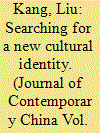

|
|
|
|
|
| Publication |
2012.
|
| Summary/Abstract |
The paper argues that China's global expansion and calls for its use of soft power are provoking an ideological crisis which is becoming one of the most critical challenges of the present time. Revolutionary ideology legitimated the rule of the Chinese Communist Party (CCP) for 60 years, but it has become increasingly at odds with the rapid socio-economic development that began 30 years ago. This paper examines four aspects of contemporary Chinese culture: first the discrepancy between the CCP's ideological rhetoric and its pragmatic policies; second, the fragmentation of the state, the intellectual elite, and the grassroots population in terms of cultural expressions and values; third, the consumer culture which has unleashed materialistic desires; and finally, the emergence of a 'post-80s' generation urban youth culture amidst these tension and contradictions.
|
|
|
|
|
|
|
|
|
|
|
|
|
|
|
|
| 15 |
ID:
151577
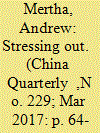

|
|
|
|
|
| Summary/Abstract |
Might authoritarian one-party systems experience something akin to party identification – or affective proximity to the Party – that waxes and wanes over time? Such cycles do not centre on elections but on the politics of succession, new policy initiatives and ad hoc housecleaning, and their focus would be officials within the system as opposed to the electorate outside it. I argue that a key mechanism animating such variation in party identification of Chinese Communist Party (CCP) cadres lies within the recurring rectification efforts seeking to temper these individuals and make them more submissive to the larger political goals of the Party centre. Such priming is largely an in-house phenomenon, taking place increasingly deeper within the CCP apparatus. This process tends to involve an extensive arsenal of institutional mechanisms that constitute a particularly big stick and within which pressures to comply can be uncomfortable, even excruciating. Normative elements of these movements, such as the language and substantive written materials used during study, analysis and self-criticism are predominantly in the service of enhancing the sheer domineering quality of the Party vis-à-vis the individuals that make up its ranks. I explore this through an examination of the three stresses (san jiang) campaign of 1998–2002.
|
|
|
|
|
|
|
|
|
|
|
|
|
|
|
|
| 16 |
ID:
187258
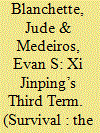

|
|
|
|
|
| Summary/Abstract |
During his first ten years in power, Chinese leader Xi Jinping has overseen substantial shifts in China’s political system and domestic economy, while also adopting a more activist and forceful foreign policy. With his likely third term beginning after the 20th Party Congress in October 2022, key questions remain about how his agenda will evolve. This article offers an assessment of Xi’s third term based on the key drivers and characteristics of Xi’s approach to domestic governance and foreign policy over the last two decades. It also explores how growing tensions and trade-offs will force policy shifts or otherwise constrain China’s growth. China seems likely to become more insular and self-referential, more frustrated and indignant and, ultimately, more alienated from the international community.
|
|
|
|
|
|
|
|
|
|
|
|
|
|
|
|
|
|
|
|
|